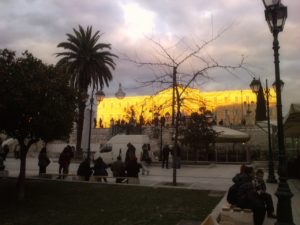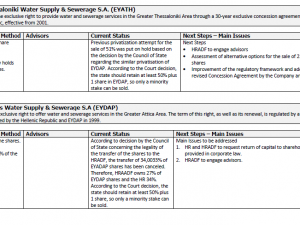
SAVEGREEKWATER hosts an important article from Stavroula Symeonidou which sheds light on the extent of the private sector’s penetration in Municipal Water Services of the whole Greek region. We thank her for the particularly useful information and we hope that this will be a start to enable us to document what is exactly happening beyond the cases of Athens and Thessaloniki.
This is what is the article:
It is well known now that EYDAP and EYATH assets have been and are to be transferred to the Superfund: accordingly the water of the two major urban centers of the country is in danger of becoming prey in the clutches of “water barons”. Obviously, by controlling water services a greater degree of dependency, impoverishment and actual enslavement of people can be achieved.
But what is exactly happening with the waters in Greece outside the two major urban centres?
Water services in the provinces are run by municipal enterprises, known by the general acronym DEYA. These enterprises are of contributory, self-funded character and are supervised by the corresponding municipalities of their regions of operations. DEYA enterprises were established in 1980, in order to take responsibility of water supply and sewage in remote regions off the central government; their role in local communities has been proved particularly important. They operated as pillars of the development of the aforementioned regions, by the employment (at an astonishing – 95% – absorption rate) of large funds from European investment programs. They also contributed significantly to the environmental protection, by the installation and operation of 250 wastewater treatment facilities. They are responsible for water supply and sewage of distant, sparsely populated, poor areas, ignoring the cost-benefit balance. They are, also, structures that defend public health by ensuring water supplies of excellent characteristics. Overall, they are local enterprises with a humanitarian attitude, having institutionalized social tariffs for vulnerable groups, thus ensuring for them the right to life. As the type of water management (tariffs – quality – social policy) which the mayors adopt can be a crucial factor for their re-election, there exists always a social control which can enforce democracy to the management. Finally, they are small or medium sized businesses (132 in total, employing 4500 workers), which provide water and sewage to the most beautiful locations of Greece, by protecting their natural wealth, as well as the largest water reserves in the country.
In the post-memoranda Greece of the last six years, the DEYA enterprises have been devalued, under the pretext of limiting fiscal deficit. Nowadays they are becoming under staffed, sold by the day, piece-by-piece at the same time outsourcing important services to private contractors (as for example water treatment facilities, breakdown recovery services, water consumption measurements services, accounting). Due to this costs rise while the quality of services decays.
What is more important (and dangerous) is that due to recent policies an enterprise can be declared unsustainable if it presents negative balance sheets in three continuous years: in such a case a simple majority of the municipal council suffices for the transfer of the enterprise even without compensation. The question reasonably arises how long will a DEYA be sustainable, when operating exclusively with contractors? Should DEYA stop the water and sewage services to distant, sparsely populated villages, as such services are definitely not profitable? Will the privatization of EYDAP work as a Trojan horse for further privatization of the DEYA enterprises? Of course DEYAs are not financially dependent on the State/Central Government therefore they do not, in any way whatsoever, contribute to the public debt; they are financed by citizens and therefore they belong to them; however they are equally restricted in (actually barred from) recruiting any new personnel, which means that over time their already limited resources will reach zero.
What is not known in urban centers is that, on the pretext of water resources protection, all traditional and modern wells in the province, even handheld pumps of house yards (under the threat of 2000 euro fine) have to be filed with the central authorities. Rainwater storage tanks kept by farmers have been banned. Farmers are mandated to install water meters in line shafts’ sections of their fields.
The imposition of the environmental fee which will apply from 2017 and on (on the pretext of “protection of water resources”),will apply to urban-, rural-, and any other water use that can be priced, therefore be bought and sold, or disposed for a price.
As a conclusion I think we should all realize the dangers looming over the waters of the whole country (urban, rural, water resources) and form a common front of resistance to that. United and determined to oppose global capitals, for which human life has no value.
Because, fighting for water is a struggle for life and democracy.
Stavroula Symeonidou
Board Member of the Pan-hellenic Federation of DEYA Workers
President of the Union of Workers at DEYA of the City of Drama




